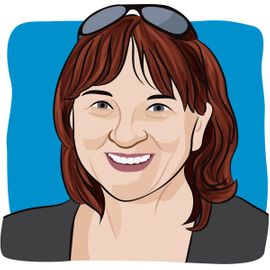- About Us
- Advertise / Support
- Editorial Board
- Contact Us
- CancerNetwork.com
- TargetedOnc.com
- OncLive.com
- OncNursingNews.com
- Terms & Conditions
- Privacy
- Do Not Sell My Information
- Washington My Health My Data
© 2025 MJH Life Sciences™ and CURE - Oncology & Cancer News for Patients & Caregivers. All rights reserved.
Breast Cancer Awareness Versus ‘It Cannot Be’

Debbie Legault is the mother of a young woman who was diagnosed with breast cancer at 27. Debbie chose to share the experience of being a full-time caregiver to her daughter during treatment in a blog called “Mom … It’s Cancer” and published the compilation of those thoughts in book format when active treatment was completed. Legault soon realized that the end of treatment was actually just another beginning and continues to write about the realities of survivorship both from her perspective as a caregiver and from her daughter’s point of view.
Denial is a very powerful thing, but it is one that can have serious negative consequences.
My daughter Adrienne first found the lump that turned out to be breast cancer three months earlier than when she went to see a doctor about it. She had been prompted by all the Breast Cancer Awareness month marketing to check her breasts and there it was. She checked it the next month, and the next, and three months later when she noticed how much it had grown it pushed her to make an appointment to get it looked at.
My child was very aware of breast cancer. She just didn’t believe it could happen to her at 27 years old. Even when the evidence was literally in her hands the denial of the possibility was so intense that she couldn’t acknowledge it. The denial was also there in all the medical professionals she dealt along the way because she was so young with no family history.
Denial is a very powerful thing. It can be a defense mechanism designed to help us cope with uncertainty and give us a hot minute to process something that we are struggling to face but it is one that can have serious negative consequences. I am not surprised, however, that my daughter wanted to pretend that the lump was just a lump.
When I asked her about the why, she sat for a minute and then said she just didn’t want to be that kind of sick. Like most people, she had experienced viruses and infections in her life but nothing as big as a cancer diagnosis. She didn’t know a lot, but she knew enough to know that the treatment was going to be grueling and that she might, at 27, lose her breast. She had seen the faces of cancer on the various cancer campaigns and she didn’t want to become one of them. And underlying all of that was the knowledge that cancer is an indiscriminate killer.
When she heard the words “It’s cancer” she didn’t jump into acceptance. On the contrary, her brain shut down and she walked around in a daze, going through the motions of life but not being present. We sat through the various appointments with ‘ologist after ‘ologist taking notes and preparing ourselves for what was to come. She walked into treatment room after treatment room to IV’s being hooked up and machines being aimed at her. But it wasn’t until over two years after diagnosis that she woke up into all the emotions that came with what she had experienced.
There is so much hope for patients these days, so many newer treatments that are especially effective if the cancer is caught early, but denial of both the patient and the medical professionals sometimes takes that option off the table and the initial diagnosis is metastatic breast cancer. There are many who think women like my daughter are “too young,” dismiss the lumps as part of a woman’s natural hormone cycle, or tag it as a clogged milk duct when women are breastfeeding even though many younger women are diagnosed post-partum. Sadly, ”It Cannot Be” on both sides of the equation is costing lives.
I would love to see a Breast Cancer Awareness campaign that featured stories of the potential negative outcome of denial, along the lines of programs like “Scared Straight.” I doubt there are many women who are not aware of breast cancer with the success the decades-old initiative has had in educating them, but if they don’t believe it can happen to them being aware is not going to help them survive. Being aware is not going to shift the thinking of physicians that lumps should be investigated regardless of what other factors may be at play.
We found out that unfortunately it can be and luckily denial didn’t take my girl from me. Let’s spread that word as far as we can so other mothers can be as lucky.
This piece reflects the author’s personal experience and perspective. For medical advice, please consult your health care provider.
For more news on cancer updates, research and education, don’t forget to subscribe to CURE®’s newsletters here.
Related Content:



